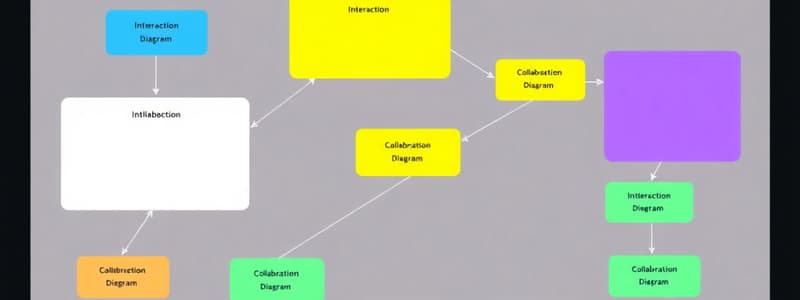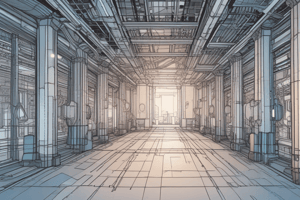Podcast
Questions and Answers
What is the primary focus of sequence diagrams?
What is the primary focus of sequence diagrams?
- Illustrating the structure of objects
- Showing the control flow by time ordering (correct)
- Depicting the states of an object
- Representing the roles of objects in a system
In a collaboration diagram, what do the directional links represent?
In a collaboration diagram, what do the directional links represent?
- Communication between objects (correct)
- State transitions of an object
- The timeline of the interactions
- Independence between objects
Which component is NOT typically found in a sequence diagram?
Which component is NOT typically found in a sequence diagram?
- Actors
- Objects
- Messages
- Transitions between states (correct)
What does a state-chart diagram primarily depict?
What does a state-chart diagram primarily depict?
In a sequence diagram, how are messages typically arranged?
In a sequence diagram, how are messages typically arranged?
Which statement about collaboration diagrams is true?
Which statement about collaboration diagrams is true?
Which of the following is a correct statement about state machines depicted in state-chart diagrams?
Which of the following is a correct statement about state machines depicted in state-chart diagrams?
What is a key characteristic of sequence diagrams?
What is a key characteristic of sequence diagrams?
Flashcards are hidden until you start studying
Study Notes
Interaction Diagrams
- Depict the interactions of objects and their relationships, including messages passed between them.
- Two types: Sequence diagrams and Collaboration diagrams.
- Used for modeling control flow:
- Sequence diagrams model control flow by time ordering.
- Collaboration diagrams model control flow of organization.
Sequence Diagrams
- Illustrate the ordering of messages according to time.
- Typically show the flow of functionality through a use case.
- Components:
- Actors: Involved in the functionality.
- Objects: The system needs these to provide functionality.
- Messages: Represent communication between objects.
Collaboration Diagrams
- Illustrate the structure of objects that send and receive messages.
- Directed graph using objects and actors as nodes.
- Focus on the roles of objects as they interact.
- Directional links indicate communication between objects.
- Links are labeled with appropriate messages, prefixed with sequence numbers for time ordering.
State-Chart Diagrams
- Show a state machine depicting an object's control flow from one state to another.
- Portray sequences of states an object undergoes due to events and responses.
- Components:
- States: Simple or Composite.
- Transitions: Between states.
- Events: Causing transitions.
- Actions: Due to events.
- Used for modeling objects that are reactive in nature.
Studying That Suits You
Use AI to generate personalized quizzes and flashcards to suit your learning preferences.




